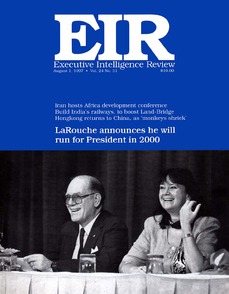Interviews
Jacques Cheminade
Jacques Cheminade is a close friend of Lyndon LaRouche and head of the French Progress and Solidarity Party; he was a candidate for President of France in 1995.
Departments
Australia Dossier
by Allen Douglas
Rio Tinto attacks the nation-state.
From New Delhi
by Ramtanu Maitra
A whiff of hope for nuclear power.
Editorial
Impeach Scalia!
National Economy
Build Indian railways for the Eurasian Land-Bridge
by Susan B. Maitra and Ramtanu Maitra
The key to fruitful trade along the southern tier of the Eurasian Land-Bridge, lies in strengthening the existing railroads that run through the Indian subcontinent from east to west. Susan B. Maitra and Ramtanu Maitra give a strategic overview of the status of Indian railways, and where improvements must be made.
Economics
Currency crises lead march to October global crash
by William Engdahl
A series of currency crises has devastated the stock markets and foreign exchange reserves of a growing number of Asian countries. Are they the precursor of a global financial earthquake?
Southern Poland can be an economic powerhouse
A statement by the Schiller Institute in Poland. The devastating floods provide an opportunity for Poland to dump free-trade economic policies.
Italy adopts a tax on derivatives
by Claudio Celani
Currency Rates
Iran takes up the fight for the development of Africa
by Muriel Mirak-Weissbach
A report on a conference in Teheran, by Muriel Mirak-Weissbach.
Business Briefs
Feature
Hongkong returns to China, while ‘the monkeys shriek’
by Mary Burdman
The “shrieking monkeys” of the world (most of them swinging around London) were not able to deter the government of China from recovering Hongkong from the current-day British Empire—financially and politically, still the most powerful single entity on Earth. Emerging from the upheavals of the Cultural Revolution, the Sino-Soviet split, decades of tensions with the United States, and many regional wars, the leaders of China realized that their nation could not develop, without stability and peace. To achieve this, it was essential, as the late Deng Xiaoping repeatedly stated, to find new, peaceful solutions for the “problems left over from the past,” such as Hongkong.
Cricket and the British Empire
by Ramtanu Maitra
International
Strategic threat to Australia: Pyongyang, or London?
Despite commendable initiatives from some official quarters in Australia, the London Privy Council’s line is that expressed by U.K. Labour Party Prime Minister Tony Blair: that all Commonwealth institutions, including Australia’s military, shall perceive tiny North Korea as the chief strategic “enemy image” of the moment.
British media work overtime vs. Australia
London puts the squeeze on Kenya
Brazil’s President Cardoso fiddles, while the nation burns
by Lorenzo Carrasco
The late June rebellion of military police in the state of Minas Gerais is being described as “one of the most serious military police rebellions since the 1964 coup d’état,” while President Cardoso spends his time studying up on etiquette for his knighthood from the Queen.
Cheminade: France’s Jospin must solve a difficult paradox
An interview with Jacques Cheminade.
The ‘Get Fujimori’ operation escalates
by Manuel Hidalgo
International Intelligence
National
Lyndon LaRouche begins Presidential campaign
by Nancy Spannaus
The “time has come,” LaRouche said in an official statement on July 18, for him to fill the leadership vacuum in the country.
A 21-year fight: LaRouche’s campaigns for the Presidency
by Susan Welsh
Explosive new developments in Nebraska child abuse case
by Allen Douglas
George Bush may be in more hot water, because a key witness in the Franklin Credit Union scandal has reappeared with new evidence, and is willing to testify.
Starr protects Bush in Whitewater farce
by Jeffrey Steinberg
Congressional Closeup
by Carl Osgood
National News



